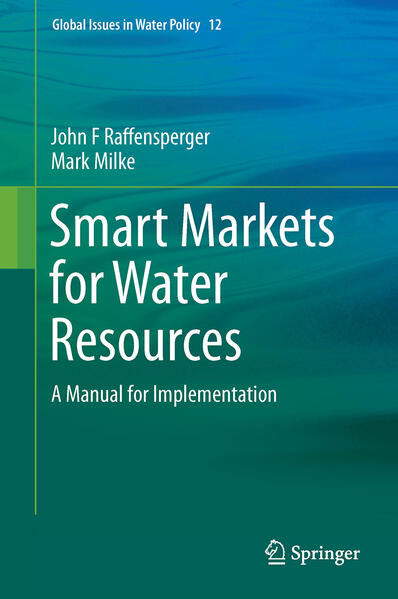
Zustellung: Fr, 27.06. - Di, 01.07.
Versand in 1-2 Wochen
VersandkostenfreiBestellen & in Filiale abholen:
Why is trade in wholesale water so rare, when markets can actively trade bread, tractors, and electricity? This book shows that water markets fail because of high transaction costs, resulting in inefficient allocations and unpredictable environmental effects. To overcome these obstacles, this book proposes a trading mechanism called a smart market. A smart market is an auction cleared with optimization. A smart market can reduce the transaction costs of water trading, while improving the environmental outcomes. The authors show why a smart market for water is needed, how it would work, and how to implement it.
The smart market described here uses a hydrology simulation of the water resource, user bids via the internet, and mathematical optimization, to maximize the economic value of water while meeting all environmental constraints.
The book provides the background to understand the smart market for water, and the detail to help the reader start working on its application. The book explores topics such as:
- Why water should be more expensive near sensitive environmental locations,
- Ways to set initial allocations of water rights,
- The role of regulatory oversight,
- How to counter objections to water markets.
The culmination of a decade of investigation, this book combines explanation, examples, and detail to inform policymakers, large water users, environmental organizations, researchers, and a thirsty public.
Inhaltsverzeichnis
1. Water allocation: the joint problem of interaction and transaction costs. - 2. Water allocation approaches: theory and practice. - 3. How water flows, how it is modelled, and how we optimize it. - 4. Introduction to smart markets. - 5. A prototype common pool smart market for water. - 6. Case studies (much more to come if space permits). - 7. Water markets in a stochastic world. - 8. Establishing a market. - 9. Initial allocation of rights. - 10. Expectations for participants-traders. - 11. Market behavior. - 12. Critical perspectives on water trading. - 13. Concluding perspectives. - 14. Appendix: outline of market-clearing code. - 15. References.
Produktdetails
Erscheinungsdatum
04. Mai 2017
Sprache
englisch
Auflage
1st ed. 2017
Seitenanzahl
348
Reihe
Global Issues in Water Policy
Autor/Autorin
John F. Raffensperger, Mark W. Milke
Verlag/Hersteller
Produktart
gebunden
Abbildungen
XXXII, 313 p. 44 illus., 22 illus. in color.
Gewicht
751 g
Größe (L/B/H)
241/160/24 mm
Sonstiges
HC runder Rücken kaschiert
ISBN
9783319550077
Entdecken Sie mehr
Bewertungen
0 Bewertungen
Es wurden noch keine Bewertungen abgegeben. Schreiben Sie die erste Bewertung zu "Smart Markets for Water Resources" und helfen Sie damit anderen bei der Kaufentscheidung.









